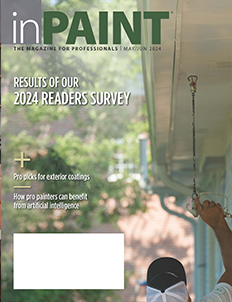Q: What motivates you to run an ecologically sustainable business, and how do you do it?
 A: Back in the ’80s, I was working in Seattle where a lot of our work was on older homes, remodels and new construction. There was a lot of tearing out of walls, scraping lots of layers of paint, using thinners, lacquer and oil-based products, and all kinds of things that left me with a lot of unease. There was just so much waste and bad stuff going into the environment.
A: Back in the ’80s, I was working in Seattle where a lot of our work was on older homes, remodels and new construction. There was a lot of tearing out of walls, scraping lots of layers of paint, using thinners, lacquer and oil-based products, and all kinds of things that left me with a lot of unease. There was just so much waste and bad stuff going into the environment.
Around that time, California started to lead the charge on Earth-friendly products and the government also started cracking down on some of the types of waste I mentioned. Not long after that, manufacturers started testing their first ‘green’ products. My reps knew that I was environmentally conscious and asked if I wanted to be a beta tester. I jumped at the opportunity. So for two to three years, our crews were trying out the first wave of waterborne products. The benefits to my business were multifold—the products were healthier for my crew, our costs were lower because we didn’t need to buy or dispose of thinners or masks, we had less waste, and washup was super easy. Really, there wasn’t anything not to like.
So I decided this was how I was going to operate … I was going to be good to the planet, good to my employees, good to my customers and, really, good to my business.
As a policy, we use green products. I never use anything that’s not waterborne unless absolutely forced to do so. We minimize waste. Things get used, reused and used again. I aim to only buy products that can be recycled or repurposed. We use canvas tarps. We clean and dry our paint cans and recycle them. Even our old t-shirts become rags. The goal is to have a full recycling can at the end of the week and nothing in the garbage. And for the most part, we’re very successful at it.
One of the really nice bonuses of our business approach is that my crews don’t get sick the way they used to in the past. There was a time that painters only lasted a few years because they’d get a little impaired from breathing in the fumes. That doesn’t happen with these new products. I honestly feel good about it and I know my crew appreciates it, too.
In fact, they now embrace the sustainable approach just as much as I do. It’s a part of our culture and they look at the job and the equipment differently. I have one guy who invented this tool that lets you cut the rim out of gallon cans to convert them to cut-in buckets. In the past, that same guy probably would have tossed the can without a thought.
And customers really appreciate the sustainable approach. I honestly believe we get more work because customers, especially women, see that the crew is respectful of the environment and their property. They know they don’t have to worry about someone dumping chemicals on their prized plantings.
Plus, for builders who are aiming for net zero energy builds, we’re the go-to company. Because of our approach, I get them two points as a painter. It’s an easy choice, as they don’t have to teach me a thing about operating in those parameters. I’m already in the culture. I encourage all pros to embrace sustainability. It’s really not hard. You need some new habits and you need to start looking at your practices with a different lens. For me, there’s zero downside and tons of upside.
_____________________________________________________________________________________________
5 TIPS FOR GOING SUSTAINABLE
1 Eliminate paperwork by going electronic with estimating, billing, time tracking, etc.
2 Reuse, repurpose and/or recycle everything
3 Use water-based products, including caulks, when possible
4 Use brushes with natural bristles and wooden handles
5 Give leftover paint to high schools and nonprofits to use in their projects
_____________________________________________________________________________________________
 Darylene Dennon is the CEO/officer/owner of Solid Energy, Inc., a successful painting and light-remodeling company in Woodinville, WA, where she handles all phases of sales, customer relations, financials, training, systems, marketing and administrative needs. She is an author and presenter on topics concerning her industry, leadership, business development and sales. SeattleAreaPainter.com
Darylene Dennon is the CEO/officer/owner of Solid Energy, Inc., a successful painting and light-remodeling company in Woodinville, WA, where she handles all phases of sales, customer relations, financials, training, systems, marketing and administrative needs. She is an author and presenter on topics concerning her industry, leadership, business development and sales. SeattleAreaPainter.com




